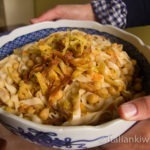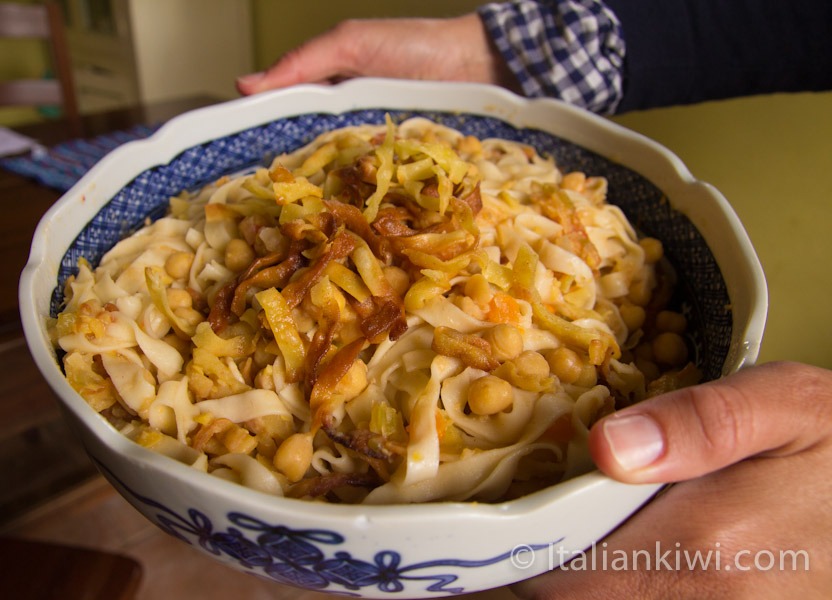I’m sure that right now you’re saying, either aloud and making all your work-mates turn to look at you, or more sensibly, in your head so that nobody knows that you’re not working, “What the heck is Ciceri e Tria??!!!”. Well, that’s what I said when I first heard of these words when we were in Puglia a few weeks ago. Ciceri e tria simply means chickpeas and tagliatelle in the Puglese dialect. I ate it for the first time at a marvelous family-run restaurant in Lecce called Alle Due Corti . Rosalba de Carlo, the matriarch of the family and restaurant founder, oversees all the diners from a table in the corner of the restaurant. You have the feeling that if you don’t eat everything on your plate, she will come over and tell you off. 🙂 The menu there full of traditional Salento dishes. Salento is the stunning region in the “heel of the boot” full of white-sand beaches, and beautiful ancient towns that still have their medieval walls.
Lecce is a beautiful, mainly pedestrian, wonderfully ornate Baroque town. It was founded when the Greeks lived there, so that means a loooong time ago. Around the area there are villages in which they still speak a dialect which is very close to ancient Greek. Amazing that it hasn’t changed over the last thousand-odd years! I say that the town is “mainly pedestrian” as you still have to watch out for the ubiquitous Fiat Pandas driving down “roads” scarcely wide enough for three people to walk abreast in, but mainly it’s a peaceful place to wander around in.
For ciceri e tria you use fresh tagliatelle made without eggs. I’m not sure what would happen if you used tagliatelle with eggs, but it may mess up the important part of the dish in which you fry part of the pasta in olive oil until it’s crispy. I haven’t done a test yet to see what happens if eggs are involved. If anyone tries it, please let me know how it goes! Just an aside here: the fried tagliatelle turn into something a little like chips. Just add a little salt and you have a delicious snack without making the rest of the dish!!
The tagliatelle are easy to make even without a pasta machine and a standing mixer. You just need a bit of muscle to knead the dough (or someone to do it for you!), and a good rolling pin. I used dried chickpeas to make this, but you could cut the process time a lot and use canned ones. Just drop the cooking time you need to make the sauce. Oh, and one more thing about the sauce: go look at the photo at the top of the page, and then remember, it should have MORE broth. I didn’t leave enough of the broth. It still tasted good, but it should be almost “soupy”. Just add more water if the chickpea mixture is drying out while cooking.
Ciceri e tria takes a bit of work to make, but it’s totally worth it! You can make the sauce the day before to cut down some of the labour on the actual day, and just heat it up again before you throw the pasta on to boil. Be courageous, take the bull by the horns, take the plunge, grab the golden ring, or just forget all those metaphors and go try to make it. It’s not as tricky as you think! (Oh, actually I don’t know if the golden ring one is actually a saying, but I like the sound of it!). It’s almost as good as going to Puglia (well, it’s not really but I wanted to make you feel better!).
By Lisa Watson

Ingredients
- 200 g 7oz All-purpose flour
- 200 g 7oz Durum wheat flour
- 1/2 tsp Salt
- 200 ml 4/5 cup Water
- 300 g 2 cups Dried chickpeas
- 1 Onion
- 1 Carrot
- 1 stalk Celery
- 1 medium - large Tomato
- to taste Salt and pepper
Instructions
The night before:
- Put the chickpeas in a large bowl filled with water and leave them to soak overnight.
- On the day:
The Sauce
- Peel the carrot and onion. Chop them into small pieces.
- Slice the celery stalk. Chop the tomato.
- Put all the vegetables in a large pot. Drain the chickpeas and add them as well. Cover with fresh water.
- Bring the mixture to the boil and scrape off any foam with a spoon.
- Lower the heat and leave to simmer until the chickpeas are tender, but not mushy. This can take anywhere from 30 minutes to an hour depending on their age. Stir every so often and check the water level isn't dropping too much.
- Add about 1 tsp of salt in the last few minutes of the cooking.
Eggless Pasta:
- Combine the flours and salt in the standing mixer (or on a clean kitchen benchtop).
- As the flours are being mixed add the water in a steady, slow stream until it becomes incorporated into the mixture (or try to knead the dough by hand and add a steady stream of water at the same time. You may need an assistant for this one!).
- Take the dough out of the standing mixer and continue to knead it by hand for 15 minutes until the dough becomes elastic and smooth.
- Wrap the dough in plastic wrap and leave it to rest for 30 minutes.
- Make tagliatelle with your pasta maker, or roll the dough out with a rolling pin until it is quite thin, then cut it into long narrow strips.
- Sprinkle flour all over the pasta so that it doesn't stick together and leave it on a tray covered with a tea-towel until ready to use.
- Boil a large pot of salted water. While it is coming to the boil, heat a few Tbsp of olive oil in a frying pan. Fry about a quarter of the pasta in the oil until it is brown and crispy. Keep a close eye on it, as it can burn quickly.
- When the water is boiling, add the rest of the pasta to the water and cook for 1 -2 minutes. Drain it and add it to the chickpea mixture. Add the fried pasta and mix it all together.
- Now, enjoy it! you've earned it after all that work!!

